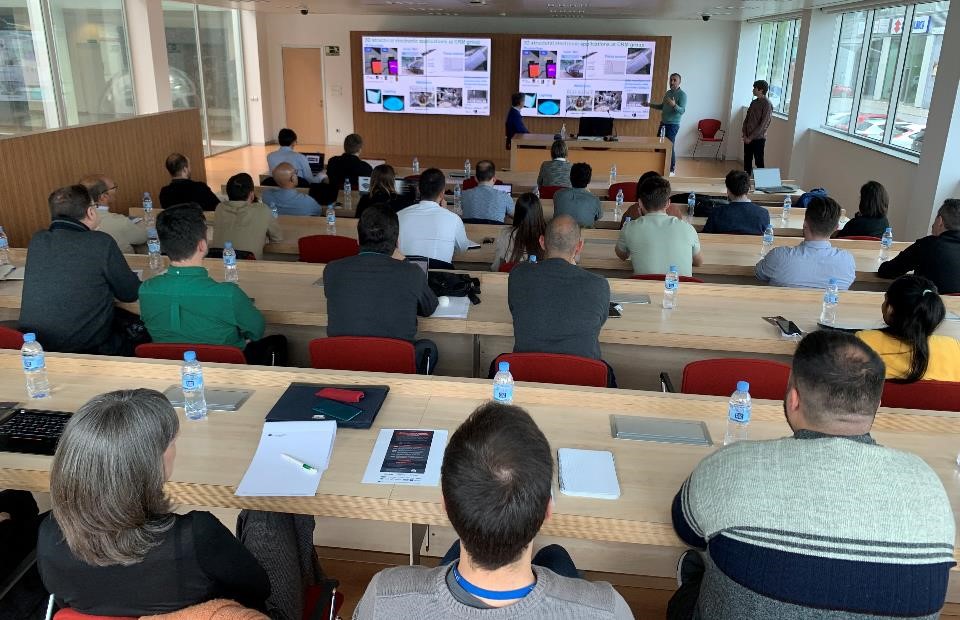CAESAR project (CirculArity Enhancements by Low quality Scrap Analysis and Refinement) works on the optimization of processes for separating and eliminating impurities from low quality scrap, both through the development of new technologies and the updating of existing ones not currently applied for the recycling of ferrous scrap. Recently, the participants in CAESAR project held the fourth periodic meeting of the project in the ArcelorMittal Dunkerque Steel Plant.
While they are approaching the mid-term milestone of the project, the project team is navigating the challenges of upgrading old ferrous scrap at industrial scale, to be consumed in the EAF and BF-BOF routes of steel-making.
So far, several technologies have been tested, stand-alone and combined, in order to clean HMS, fragmentised and ferrous WEEE scrap and to produce Fe-rich streams with improved morphology, reducing steriles content and separating other metallic elements. During the Consortium Meeting, held on the premises of ArcelorMittal Dunkerque, the partners of CAESAR project had the opportunity to discuss the results of the characterization of the cleaned samples, to evaluate the cleaning efficiency achieved and to decide on next actions with the most promising solutions.
Scrap sorting trials using a range of sensors are also underway, demonstrating their feasibility to sort scrap materials by their content in some detrimental elements or characteristics. The results were examined in the meeting and the partners dealt with the issue of how integrating in multi-step scrap upgrading schemes the most suitable sensing technology for each type of scrap and cleaning requirements. The scaling-up aspects, for sorting and cleaning technologies, were also debated.
In parallel, first steps for the valorization of the non-ferrous fractions rejected in the scrap cleaning and sorting processes are being taken. Several partners are taking part in the characterization of the recovered non-ferrous metals and non-metallic materials and are defining the proper applicability research for each secondary raw material. When it comes to AZTERLAN, the Metallurgy Research Centre is collaborating with INATEC to obtain copper-rich and aluminium-rich fractions that meet the specifications to be valorizable as pearlite promoter in cast iron and deoxidiser in steel, respectively.
Apart from the sorting and cleaning techniques to reach the aimed analytical content, other relevant subjects in scrap yard management and in the definition of the BOF charge recipe are under development in the project, such as inline scrap volume and density calculation methods (on truck delivery and on bucket loading), based on 3D-scanning. Besides, soft solutions for scrap characterization are being developed and the modelling results of metal composition in Gent’s BOF by statistical learning were presented in the meeting.
While those activities are progressing, the participating steel plants (ArcelorMittal Sestao, ArcelorMittal Gent, ArcelorMittal Dunkerque) are evaluating the quality of the liquid metal when using various unprocessed scrap grades in different mix ratios in the charge to the furnace. In the workplan discussion in Dunkerque, it was agreed to identify the specific scrap grade requirements for the upcoming validation trials with cleaned scrap in each demo plant and work on the logistic coordination.

Left. AZTERLAN researchers David García and Clara Delgado at CAESAR project’s 4th meeting with the representatives of the rest of consortium member organizations. Right. Visit to the ArcelorMittal Dunkerque steel plant.
Visit to ArcelorMittal Dunkerque steel plant
As the meeting was held in the ArcelorMittal Dunkerque facilities, the consortium had the opportunity to visit the steel plant through a guided tour around the installations, where the coke oven, the sinter plant, the blast furnaces, the converters and the hot rolling mill were watched. The focus of the visit was on the scrap yard and its digitalised cockpit, where CAESAR partners could witness the scrap management operations and the buckets charging; and they were introduced to the scrap cleaning machine used in some trials of the project.
The next CAESAR Consortium Meeting will be hosted by AZTERLAN in October 2024. By that time, it is planned to have defined the primary and advanced treatment routes for the scrap grades to be validated in each BOF and EAF.
The CAESAR project consortium is participated by Centre de Recherches Métallurgiques (project coordinator), ArcelorMittal Basque Country Research Centre, ArcelorMittal Maizières Research, Rolanfer Recyclage, Reydesa Recycling, INATEC, TOMRA Recycling, ArcelorMittal Belgium, AZTERLAN Metallurgy Research Centre, Katholieke Universiteit Leuven, ArcelorMittal Sestao and ArcelorMittal France. The project is funded by the European Union under Grant Agreement 101058520.


